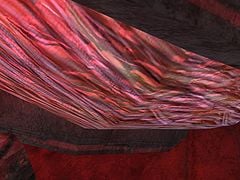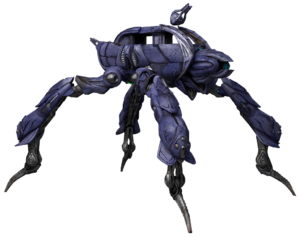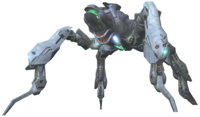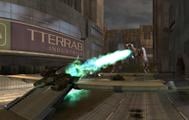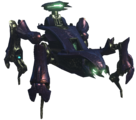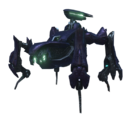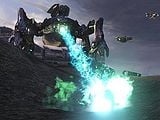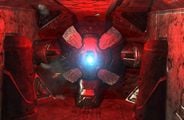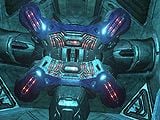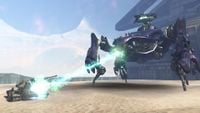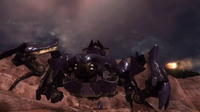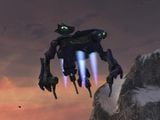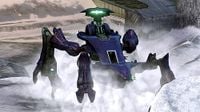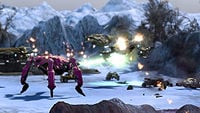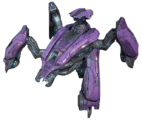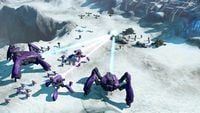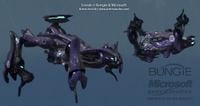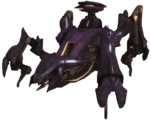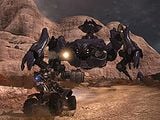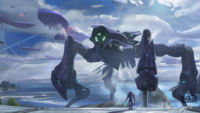Deutoros-pattern Scarab
From Halopedia, the Halo wiki
- "We've all run the simulations. They're tough, but they ain't invincible!"
- — Sergeant Major Avery Johnson[1]
The Type-47 Ultra Heavy Assault Platform, more commonly known as the Scarab, is a Covenant quadrupedal siegeworks ultra-heavy artillery assault platform. A mobile mining platform adapted for use in combat, it is used to attack heavily defended structures and emplacements and to provide nearly-unstoppable combat support to Covenant ground forces.[2][3]
Design
At least two models of the Scarab exist: the Deutoros and the Protos.[4] Both models are extremely powerful, possessing potent armament and armor. Although the Scarab appears to be a traditional vehicle, it is actually a bio-mechanical construct, a Mgalekgolo,[5] that is controlled by thousands of Lekgolo "eels". The chassis is built in specialized facilities, such as the Assembly Forges on the now-destroyed Covenant capital city High Charity. The Lekgolo are capable of maneuvering the Scarab on their own; however, each platform includes a pilot who guides the Scarab, along with infantry who are stationed to repel boarders and, in the case of the T-47B, to operate its deck-mounted Type-52 plasma cannons.[2]
Despite its prodigious firepower, the Scarab is highly vulnerable to being boarded; the platform has many openings, and the central core is protected only by the vehicle's external armor, so attacking the core is relatively easy once a hostile boards the craft. A Deutoros Scarab will also be temporarily stalled if its legs sustain enough damage, causing the vehicle to crouch and allowing a would-be boarder to jump into the vehicle's troop bay. To counter this, Scarabs typically carry squads of Unggoy and Kig-yar, as well as some Jiralhanae and Sangheili. On the Protos Scarab, an energy shield can be produced in front of the corridor leading to the cockpit in order to hamper boarding actions.[6]
Mobility
Unlike most Covenant vehicles, the Scarab does not use anti-gravity propulsion to move; it instead uses a quadrupedal "leg" assembly for locomotion. These jointed legs are very powerful, capable of crushing vehicles ranging from civilian cargo trucks to M808B Main Battle Tanks; they are strong enough to even withstand the shock of low-orbital drop.[7][8] The legs are also very nimble, affording the Scarab a surprising degree of maneuverability; for example, the Protos Scarab can mantle inclines in excess of forty-five degrees[9] and can attempt to right itself if it is knocked off balance.[8] The Protos Scarab, and possibly the Deutoros as well, is capable of operating underwater, if only for brief periods.[9]
Armament
The Scarab's primary armament is a focus cannon mounted on the "head" at the front of the platform. The weapon fires a stream of superheated plasma, capable of decimating nearly any infantry or vehicle in its path. In both the Protos and Deutoros designs, the cannon is housed in a cradle that is protected by flaps, which open before firing. The focus cannon has a relatively low rate of fire and is typically discharged in brief bursts. As the weapon is fired, it releases a green-glowing liquid, which may be coolant. The effective range of the focus cannon is rather short, being about 650 meters, and the blast can easily be evaded at a distance, but Scarabs have exceptional target-spotting capabilities.[note 1]
While the Deutoros and the Protos both use a focus cannon as their primary weapon, their secondary and tertiary armaments differ. Both models are equipped with secondary heavy plasma cannons which serve primarily as anti-aircraft weapons, and have a greater effective range than the focus cannon. The Deutoros Scarab carries two, while the Protos carries a single spine-mounted cannon.
Additionally, the Deutoros Scarab carries three Type-52 plasma cannons. These are used primarily in an anti-infantry role but are also effective against light vehicles and, to a lesser extent, light aircraft such as AV-14 Hornets. The Scarab's crew also use these weapons to repel boarders; however, if one of these plasma cannons is captured, it can be used to deadly effect against the crew and the platform's core.
Versions
Type-47A 'Protos' model
Of unknown origins even to the Covenant forces that were issued them, the Protos towers roughly fifty meters into the air, dwarfing the Deutoros design.[4] During the Human-Covenant War, the Protos Scarab was deployed much less extensively than its Deutoros counterpart. The Protos is considerably larger and more heavily armored, capable of withstanding 90mm shells, 102mm shaped charges, .50 caliber rounds, and ANVIL-II Air-to-Surface Missiles,[1] However, it can carry a larger complement of warriors to defend itself.[1] An energy field can be deployed in the access corridor to prevent boarders from reaching the cockpit.[6] Covenant forces almost never used the Protos Scarabs for direct combat, and later analysis of Covenant records confirmed it was classed as a specialized artifact-retrieval vehicle, with a fine-tunable focus cannon and specialized sensor arrays that human forces rarely had the opportunity to observe as it burned its way through their defenses.[4]
Type-47B 'Deutoros' model
The Deutoros[4], being much more common than its larger counterpart, was deployed frequently during the Human-Covenant War. Its "knees" may buckle under persistent fire, and small aircraft, such as the AV-14 Hornet, can deploy troops onto the deck with relative ease. It is likely that the Deutoros also has conventional controls, as it can be piloted by humans just as its larger Protos brethren can be.[10] The Deutoros's impressive maneuverability and firepower, as well as its ability to be fielded in relatively large numbers, made it a deadly threat to United Nations Space Command forces.
Operational history
Despite being encountered as early as 2527 the UNSC did not catalog the Protos and Deutoros Scarabs until 2547.[4] During the Battle of Shield World 0459 the Covenant would deploy T-47B Scarabs in efforts to stop not only the crew of the UNSC Spirit of Fire but also the Flood and Sentinels too. Rarely employed against the Outer Colonies, the Type-47 began to be fielded in large numbers near the end of the Covenant War to crush UNSC fortifications on Inner Colony worlds.[4] Multiple T-47B Scarabs were used by the Covenant during the Fall of Reach.
When the Prophet of Regret invaded Earth he deployed at least five Type-47 Scarabs.[11] John-117 managed to board and disable a T-47A Scarab before the Solemn Penance jumped into slipspace while the UNSC Brasidas managed to disable another T-47A with its MAC.[12] When the Prophet of Truth's Jiralhanae-led reinforcements arrived shortly after the Solemn Penance's retreat multiple T-47B Scarabs were deployed around Mombasa. During the Battle of Earth SPARTAN-II Blue Team destroyed a T-47A Scarab.
During the Battle of Installation 05 Avery Johnson piloted a T-47A Scarab and blasted open the doors to Installation 05's control room so Arbiter Thel 'Vadam could stop the activation of the Halo. During the Battle of Voi John-117 destroyed a T-47B Scarab that was protecting a Type-27 Mantis. The Prophet of Truth deployed multiple T-47B Scarabs during the Battle of Installation 00. Outside the Ark's Cartographer John-117 destroyed one T-47B Scarab with an M808 Scorpion and later destroyed two T-47B Scarabs outside the Citadel with an AV-14 Hornet.
Gameplay
Halo 2
The Halo 2 Scarab was almost indestructible and immune to damage in the game. Its movement was entirely scripted, and no damageable parts appear to have been coded for it. It was only destroyed in a cutscene. When the T-47A Scarab fires, some molten, green liquid (possibly coolant or excess plasma) will leak out below the main cannon.
The forward plasma turret could be destroyed with just a few melee attacks, as could the rear plasma turret. The flaps on the main gun could be destroyed only by using a Scorpion tank. Also, the underside grate could be destroyed.
Halo 3, Halo 3: ODST, and Halo: Reach
Halo 3 Scarabs have far more destructible parts than their Halo 2 predecessors. Destructible armor covers each joint of a Scarab's legs, and doing enough damage to the legs will cause the Scarab to go into lockdown, making it stop moving altogether. The flaps covering the main gun can be destroyed, though this does not affect the gun's operation. The crest on and around the rear anti-air turret can be completely blown off, slowing the turret's rate of fire and reducing the size of its plasma bolts. Two side door panels near the bottom of the Scarab's back can be torn off, allowing entry onto the vehicle.
A Scarab's rear armor possesses a glowing red circle; inflicting enough damage upon this circle will detach the armor, leaving the Scarab's core exposed. The core itself can be destroyed; its destruction will trigger a massive explosion that blows the Scarab into pieces, leaving few parts intact.
If one can successfully manage to board the Scarab in Halo: Reach, they will find that only the core of the Scarab can be destroyed. All other parts of the Scarab, including Plasma Cannons, cannot be destroyed. Destroying the core of the Scarab will also not destroy the Scarab itself. Instead, it will expose a hole in the Scarab, which bleeds orange Lekgolo blood if shot.[13]
Halo Wars
Halo Wars features the Deutoros Scarab as a playable unit in Skirmish and multiplayer modes, though it is smaller for the sake of gameplay. Each Scarab costs 3,000 resources and 20 population in Skirmish, with no upgrades available due to their cost. Up to two can be spawned at a time in a Standard mode and four in Deathmatch mode. The latest Title Update for Halo Wars enhanced the Scarab by providing an additional 25% hitpoints and produces increase damage of 25%, and is now capable of surviving four direct MAC blasts as a result of the improved hitpoints.
The Scarabs excel at attacking vehicles and infantry with their powerful weapons, though aircraft take longer for the Scarab to take down. Scarabs are very mobile, being able to climb over most obstacles. Only certain obstructions, like craters or fire, can block them. In the campaign level Beachhead, the player may use a Spartan to commandeer an abandoned Scarab. Commandeering this Scarab and using it to destroy twenty-five enemy units unlocks the achievement Beaming with Pride.
Scarabs are extremely difficult to destroy. Overwhelming it with a massive attack force works well, particularly when using anti-vehicle units like the Special Purpose-42 Main Battle Tank or some Hunters, but a significant portion of the attack force will be lost in the process. An upgraded MAC blast or carpet bomb can destroy a Scarab rather quickly, as can a group of AC-220 Vultures using their missile barrages. Covenant leader units' special abilities can inflict massive damage on a Scarab, with the Prophet of Regret's cleansing beam being a good example.
Winning a Skirmish game with two Scarabs unlocks the 2 Bugs Are Better Than 1 achievement.
Trivia

|
Browse more images in this article's gallery page. |
- Unlike all other known Covenant vehicles, the Scarab, as well as its smaller counterpart, the Locust, is named after an insect rather than a supernatural entity. These insects, however, do have significant supernatural relevance; Scarabs being a part of Egyptian mythology and Locusts one of the "Ten Plagues of Egypt." Both scarabs and locusts are also poorly regarded for their razing of crops, so the UNSC likely named these vehicles in reference to these factors, as well as because of their insectoid resemblance.
- During an interview, Shi Kai Wang joked that the V1 Scarab looks like a shopping basket.[14]
- During the level The Covenant in Halo 3, two Scarabs are deployed by the Covenant fleet overhead in order to defend the Citadel. However, on the previous level, "The Ark", Rtas 'Vadum states, "Truth's fleet lies in ruins." It is possible that these are launched by a remaining ship as an unsuccessful final push to win the battle, or could belong to Truth's Dreadnought, which did not participate in the battle. It is also possible that 'Vadum simply meant that Truth's fleet had been tactically defeated, but not completely destroyed; since only the Shadow of Intent disengages from battle, it is possible that the other ships in Truth's fleet were still fighting the Sangheili fleet.
- In Halo 2, the player can obtain the "Scarab Gun" on the level Outskirts and Metropolis. The weapon uses the Plasma Rifle chassis, though it fires the same plasma stream as the Scarab's main gun, never overheats, and can fire indefinitely. Obtaining the Scarab Gun in Halo 2 Vista rewards the player with an achievement.
- A Scarab's explosion is extremely visible; Rtas 'Vadum remarks about how he saw the explosion of a Scarab from orbit, although it is probable that he was either exaggerating or was magnifying the battle on his view-screen.
- Early in the development of Halo: Reach, there was to be a level between New Alexandria and The Package in which the player would navigate a Scarab through the ruins of New Alexandria. According to Marcus Lehto, the level was cut because it was "a little crazy".[15]
- On three occasions in Halo: Reach, Scarabs come within dangerous proximity to the player character, yet the player is unable to fight or board them. Martin O'Donnell refers to these moments as "Scarab teases."[16]
- The V2 Scarab was recreated for use in Halo ActionClix; it is the largest figure ever made by WizKids, the game's creator. A battle-damaged version was released at the 2007 San Diego Comic-Con for $250, which included the Scarab, two outdoor maps, an indoor map, (representing the Scarab's interior), four character cards, and rules for both the Scarab and the game itself. A normal model was also released at select retailers in November 2007.
Glitches
- Main article: Glitches
- In Halo 3 and Halo 3: ODST, if the player jumps onto one of the legs of a Scarab, and the leg rises up, it will cause the player to fly through the air for a considerable distance and finally die after a while, possibly after hitting a barrier.
- On the Halo 3 level The Ark, a glitch can be used to create an "undead Scarab".[17] When the level's Scarab first appears, it walks past the player and behind a cliff face; when the player makes it to the end of the area, it walks back in. If a player uses a Ghost to board the Scarab while it walks behind the cliff face, he can destroy the Scarab prematurely. From there, another player must simply get to the end of that section, triggering the Scarab's return. The damaged front half of the destroyed Scarab will walk out and then stay still.
- In Halo 3, The player can steer a Scarab. To do this, a player must board the Scarab, go to the front of the lower deck, and run into either the left or right wall. The Scarab will go in that direction, possibly because the Scarab attempts to reorient itself in order to get a clear shot at the player.
- On the Halo 3 level The Covenant, if a player manages to kill a Scarab before its landing animation is finished, the Scarab will briefly go underground and launch everyone on board across the level.
Gallery
- Hgnpng.png
The highly stylized Protos Scarab featured in Second Sunrise Over New Mombasa.
A Scarab on Reach being harassed by Carter-A259's D77-TC Pelican.
- Scarabsheet1.jpg
Concept art of the Deutoros Scarab for Halo Wars.
SPARTAN-B312 firing a rocket at a Scarab.
List of appearances
- Halo: First Strike (First appearance)
- Halo 2
- Halo: Ghosts of Onyx
- Halo Graphic Novel
- Halo: Uprising
- Halo 3
- Halo Wars
- Halo 3: ODST
- Halo Legends
- Halo: Evolutions - Essential Tales of the Halo Universe
- Halo: Reach
- Halo 4 (Mentioned only)
- Halo: Spartan Assault (Cutscene only)
- Halo 2 Anniversary
- Halo: New Blood
- Halo: Spartan Strike
- Halo: Hunters in the Dark
Notes
- ^ On the Halo 3 level The Covenant, even if the player glitches out of the invisible barriers with a Hornet and flies until he or she can barely see a Scarab, it will still shoot at them.
Sources
- ^ a b c Halo 2, campaign level Metropolis
- ^ a b Halo Waypoint: Scarab (defunct, backup on Archive.org)
- ^ Halo Encyclopedia, page 244
- ^ a b c d e f Halo Waypoint - Universe: Scarab
- ^ Halo: The Essential Visual Guide, page 163
- ^ a b Halo 2, campaign level The Great Journey
- ^ Halo 3, campaign level The Covenant
- ^ a b Halo: Reach, campaign level The Pillar of Autumn
- ^ a b Halo 3: ODST, campaign level Coastal Highway
- ^ Halo Wars, campaign level Beachhead
- ^ Halo Waypoint: Canon Fodder - Scarab Tactics
- ^ Halo Waypoint: New Mombasa
- ^ Halo: Reach
- ^ Halo 3 Essentials. Disc 1
- ^ Halo Reach Legendary Edition - Developer Commentary Part 6
- ^ Halo Reach Legendary Edition - Developer Commentary Part 4
- ^ YouTube: Halo 3 Tricks: Episode 62 *Undead Scarab*
